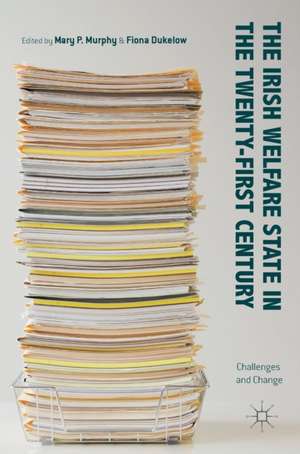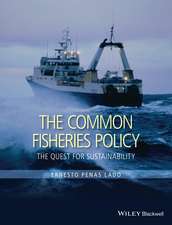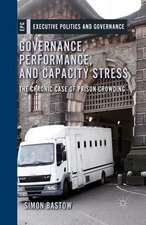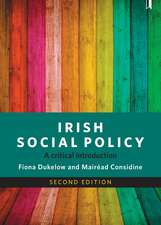The Irish Welfare State in the Twenty-First Century: Challenges and Change
Editat de Mary P. Murphy, Fiona Dukelowen Limba Engleză Hardback – 12 oct 2016
This book provides a critical and theoretically-informed assessment of the nature and types of structural change occurring in the Irish welfare state in the context of the 2008 economic crisis. Its overarching framework for conceptualising and analysing welfare state change and its political, economic and social implications is based around four crucial questions, namely what welfare is for, who delivers welfare, who pays for welfare, and who benefits. Over the course of ten chapters, the authors examine the answers as they relate to social protection, labour market activation, pensions, finance, water, early child education and care, health, housing and corporate welfare. They also innovatively address the impact of crisis on the welfare state in Northern Ireland. The result is to isolate key drivers of structural welfare reform, and assess how globalisation, financialisation, neo-liberalisation, privatisation, marketisation and new public management have deepened and diversified their impact on the post-crisis Irish welfare state. This in-depth analysis will appeal to sociologists, economists, political scientists and welfare state practitioners interested in the Irish welfare state and more generally in the analysis of welfare state change.
Preț: 731.59 lei
Preț vechi: 892.19 lei
-18% Nou
Puncte Express: 1097
Preț estimativ în valută:
140.01€ • 152.03$ • 117.61£
140.01€ • 152.03$ • 117.61£
Carte tipărită la comandă
Livrare economică 23 aprilie-07 mai
Preluare comenzi: 021 569.72.76
Specificații
ISBN-13: 9781137571373
ISBN-10: 1137571373
Pagini: 323
Ilustrații: XXV, 337 p. 26 illus., 5 illus. in color.
Dimensiuni: 148 x 210 x 32 mm
Greutate: 0.56 kg
Ediția:1st ed. 2016
Editura: Palgrave Macmillan UK
Colecția Palgrave Macmillan
Locul publicării:London, United Kingdom
ISBN-10: 1137571373
Pagini: 323
Ilustrații: XXV, 337 p. 26 illus., 5 illus. in color.
Dimensiuni: 148 x 210 x 32 mm
Greutate: 0.56 kg
Ediția:1st ed. 2016
Editura: Palgrave Macmillan UK
Colecția Palgrave Macmillan
Locul publicării:London, United Kingdom
Cuprins
Introduction; Mary P. Murphy and Fiona Dukelow.- Chapter 1. Welfare states: how they change and why; Fiona Dukelow and Mary P. Murphy.- Chapter 2. The Irish social protection system: change in comparative context; Mel Cousins.- Chapter 3. Activation: solving unemployment or supporting a low pay economy?; Micheál L. Collins and Mary P. Murphy.- Chapter 4. Redistribution in the Irish pension system: upside down?; Gerard Hughes and Michelle Maher.- Chapter 5. Personal finance: financial services, access, credit and debt management; Stuart Stamp.- Chapter 6. Irish water services reform: past, present and future; Fiona Dukelow.- Chapter 7. Reform of the Irish healthcare system: what reform?; Sara Burke.- Chapter 8. Early childhood education and dare: a neglected policy arena?; Nóirín Hayes.- Chapter 9. New managerialism: a political project in Irish education; Bernie Grummell and Kathleen Lynch.- Chapter 10.- Social housing policy and provision: a changing regime?; Joe Finnerty, Cathal O’Connell and Siobhan O’Sullivan.- Chapter 11. Crisis and corporate welfare; Nat O’Connor and Paul Sweeney.- Chapter 12. Ireland and crisis: one island, two different experiences; Féilim Ó hAdhmaill.- Conclusion; Mary P. Murphy and Fiona Dukelow.
Notă biografică
Mary P. Murphy is Lecturer in Irish Politics and Society at Maynooth University, Ireland
Fiona Dukelow is a Lecturer in the Department of Applied Social Studies, University College Cork, Ireland
Textul de pe ultima copertă
‘In an age of uncertainty, this book represents an important contribution to debate on the futures of welfare states. Incorporating detailed investigation of less visible concerns of social policy alongside more traditional analytical territory, it provides both a source of reference, chronicling welfare state change in Ireland, and readable, scholarly accounts of that change.’ - Zoë Irving, University of York, UK
This book provides a critical and theoretically-informed assessment of the nature and types of structural change occurring in the Irish welfare state in the context of the 2008 economic crisis. Its overarching framework for conceptualising and analysing welfare state change and its political, economic and social implications is based around four crucial questions, namely what welfare is for, who delivers welfare, who pays for welfare, and who benefits. Over the course of ten chapters, the authors examine the answers as they relate to social protection, labour market activation, pensions, finance, water, early child education and care, health, housing and corporate welfare. They also innovatively address the impact of crisis on the welfare state in Northern Ireland. The result is to isolate key drivers of structural welfare reform, and assess how globalisation, financialisation, neo-liberalisation, privatisation, marketisation and new public management have deepened and diversified their impact on the post-crisis Irish welfare state. This in-depth analysis will appeal to sociologists, economists, political scientists and welfare state practitioners interested in the Irish welfare state and more generally in the analysis of welfare state change.
Mary P. Murphy is Lecturer in Irish Politics and Society at Maynooth University, Ireland
Fiona Dukelow is a Lecturer in the Department of Applied Social Studies, University College Cork, Ireland





















